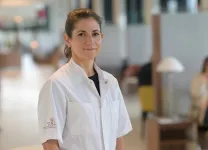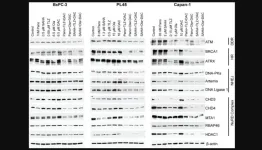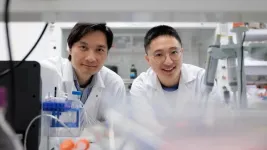Researchers led by UMass Amherst solve 2,000-year-old mystery of the shipworm
Secret of the world’s most destructive and intriguing mollusk has implications for everything from climate change to human health
2024-06-05
(Press-News.org) June 5, 2024
Researchers Led by UMass Amherst Solve 2,000-Year-Old Mystery of the Shipworm
Secret of the world’s most destructive and intriguing mollusk has implications for everything from climate change to human health
AMHERST, Mass. – They bedeviled ancient Greek navies, helped shipwreck Christopher Columbus, aided in the sinking of the Spanish Armada and caused the wharves in San Francisco Bay to collapse into the sea, but until now, scientists have been unable to pinpoint exactly how shipworms—a family of mollusks—are able to cause such damage. A team of researchers, jointly led by the University of Massachusetts Amherst and the University of Plymouth, along with collaborators from the University of Maine and UMass Chan Medical School, have discovered that a population of symbiotic microbes, living in an overlooked sub-organ of the gut called the “typhlosole,” have the ability to secrete the enzymes needed to digest lignin—the toughest part of wood.
“Shipworms are such important animals,” says Reuben Shipway, co-corresponding author of the research published recently in International Biodeterioration and Biodegradation and who initiated this work as part of his postdoctoral fellowship at UMass Amherst. “They are found throughout the world’s oceans and not only have they changed history, they are also ecosystem engineers and play a fundamental role in cycling carbon in aquatic environments. It’s incredible that we haven’t had a full understanding of how they do this.”
Wood is a miraculous substance: flexible and tough, its stringy but nutritious cellulose can make a great meal—but only for those living things that can digest it and also get through the layer of lignin, a tough, armor-like substance that surrounds the cellulose like “wrap rage”-inducing packaging around your favorite treat. Microbiologists have long known that those animals capable of digesting lignin—like termites—host specialized, symbiotic colonies of microbes in their guts that do the work of breaking the lignin down for them. “But,” says lead author Barry Goodell, recently retired professor of microbiology at UMass Amherst and emeritus professor at the University of Maine, “the shipworm’s digestive tract has long been thought to be virtually sterile.”
How then do shipworms do what they do?
Goodell and Shipway have spent the better part of the last decade trying to answer this question, testing a variety of innovative hypotheses—none of which gave up the shipworms’ secret.
“We decided to take a very careful look at the shipworm’s gut again,” says Goodell, “on the off chance that the last hundred years’ worth of researchers missed something.”
Indeed, that appears to be the case.
It turns out that shipworms have a curious sub-organ, called a typhlosole—“it looks like Salvador Dali’s mustache upside down,” says Shipway—that is embedded in the mollusk’s digestive tract. Previous researchers had thought that it served as a mixing structure, but, when Goodell and Shipway did some precise culturing work, then enlisted the aid of the Argonne National Lab’s facilities for metagenomic analysis as well as the advanced genetic-probe-microscopy technique at the UMass Amherst Institute for Applied Life Sciences, they found what generations of researchers had overlooked: hidden clusters of bacterial symbionts with the capability to produce lignin-digesting enzymes.
Not only does this research help to solve a longstanding mystery, but the findings may also have important practical application. Biotech companies are searching for new enzymes that can digest recalcitrant substrates more efficiently than current bio-industrial processes allow, and new sources of enzymes that can open the structure of biomass residues are very important in growing this field. Furthermore, previous shipworm symbionts have proven to be a treasure trove of natural products—such as novel anti-parasitic antibiotics—which may have significant impacts on human health.
On the climate change front, research such as this can help refine models predicting how CO2 and other greenhouse gasses are released into the environment, especially given that large amounts of woody debris on land winds up in the ocean, where much of it passes through the shipworm gut.
Finally, other animal species, including other mollusks, the common earthworm and even the tadpole stages of frogs, also possess a typhlosole that has not been thoroughly studied before. If symbionts similar to those in shipworms were found in those animals, it could change our understanding of how those animals also make their way in the world. “It’s very satisfying,” says Goodell of the research. “We’ve been trying to crack this mystery for years and we finally discovered the shipworm’s hidden bacterial symbiont secret.”
Contacts: Barry Goodell, bgoodell@umass.edu
Daegan Miller, drmiller@umass.edu
END
[Attachments] See images for this press release:
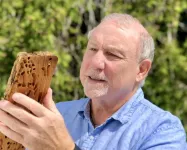
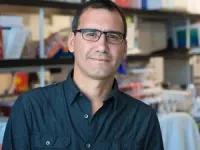
ELSE PRESS RELEASES FROM THIS DATE:
2024-06-05
A short course of immunotherapy was found to be highly effective in a subset of patients with colon cancer. The treatment, which consisted of two cycles of immunotherapy prior to surgery, was effective in almost all patients. In two third of patients, there were no longer any live tumor cells at the time of surgery. The patients’ immune system had cleaned up the cancer cells. These groundbreaking discoveries were made as part of the NICHE-2 trial at the Netherlands Cancer Institute and have been published in the New England Journal of Medicine.
Patients with colon cancer with ...
2024-06-05
BIRMINGHAM, Ala. – Preliminary clinical data for glioblastoma multiforme patients enrolled in a Phase 1 clinical trial at the University of Alabama at Birmingham demonstrated that 92 percent of evaluable patients treated with INB-200 exceeded a median progression-free survival of seven months with concomitant temozolomide chemotherapy. The median follow-up was 11.7 months.
This survival data along with radiographic improvements are indicative of positive treatment effects, which highlights the potential of IN8bio’s genetically modified, chemotherapy-resistant gamma-delta T cells ...
2024-06-05
New Haven, Conn. — Negative early life experiences, such as attending segregated schools, contribute significantly to cognitive decline and cognition disparities between older Black and white Americans, according to a new study led by researchers at the Yale School of Public Health.
The study, published in JAMA Internal Medicine, is the first to look at the impact of school segregation upon later life cognition using a large representative sample of the U.S. population, said lead author Xi Chen, associate professor of public ...
2024-06-05
After an extensive national search, Jessica Snowden, MD, MS, FAAP, MHPTT, a nationally recognized pediatric infectious disease specialist and researcher, has been named the new vice chancellor for Research at the University of Tennessee Health Science Center, effective September 1. She will also serve as a professor in the College of Medicine in the Department of Pediatrics.
Currently the vice dean for Research and chief of Pediatric Infectious Diseases at the University of Arkansas for Medical Sciences (UAMS), Dr. Snowden is known as a dedicated mentor and a leader in integrating clinical, research, and academic efforts to advance the understanding ...
2024-06-05
“The results provide novel preclinical data that demonstrate synergism between HDACi- and PARPi-mediated inhibition of DNA repair and decitabine in pancreatic cancer [...]”
BUFFALO, NY- June 5, 2024 – A new research paper was published in Oncotarget's Volume 15 on June 3, 2024, entitled, “Synergistic cytotoxicity of histone deacetylase and poly-ADP ribose polymerase inhibitors and decitabine in pancreatic cancer cells: Implications for novel therapy.”
Histone deacetylase inhibitors (HDACi) can modulate the acetylation status of proteins, influencing the genomic instability exhibited by cancer cells. Poly (ADP ribose) ...
2024-06-05
Diabetes rates continue to rise, with 11.7 million Canadians living with diabetes or pre-diabetes. At UBC, scientists have created a pain-free drug delivery method to help people with diabetes manage the disease and maintain their health more easily.
Researchers at the Li Lab have developed oral insulin drops that when placed under the tongue are quickly and efficiently absorbed by the body, potentially replacing the need for insulin injections.
The drops contain a mixture of insulin and a unique cell-penetrating peptide (CPP) developed ...
2024-06-05
EMBARGOED FOR RELEASE UNTIL 4 P.M. ET, WEDNESDAY, JUNE 5, 2024
MINNEAPOLIS – A new study suggests that people who take a few common drugs may have a decreased risk of having a bleeding stroke due to a ruptured brain aneurysm. The study is published in the June 5, 2024, online issue of Neurology®, the medical journal of the American Academy of Neurology. The results do not prove that these drugs reduce the risk of this type of aneurysm; they only show an association.
“We urgently need new ways to prevent this type of stroke, which occurs at younger ages and with a higher death rate than other types of stroke,” said study author Jos Peter Kanning, ...
2024-06-05
The Gerontological Society of America (GSA) has received renewed grant support to welcome a 15th class of reporters for the Journalists in Aging Fellows Program. The 2024 funders to date include Silver Century Foundation, The John A. Hartford Foundation, and National Institute for Health Care Management Foundation (NIHCM).
Since its founding in 2010, this program has been responsible for more than 800 news stories produced by 231 alumni. It has two goals: to educate journalists about issues in aging, better allowing them to spread a new awareness to general-audience, ethnic, and other minority populations; and to disseminate information about new scientific findings, ...
2024-06-05
Cyberattacks driven by Artificial Intelligence (AI) pose unprecedented risks to global economies, supply chains, and trade. A forthcoming study from the journal Risk Analysis explores the cascading impacts of AI-driven cyberattacks.
Unlike traditional cyberattacks, which are typically manual or scripted, AI-driven cyberattacks utilize AI and machine learning algorithms to enhance their effectiveness, stealthiness and adaptability. AI-driven cyberattacks can autonomously learn and evolve their tactics, techniques and procedures based on real-time feedback and environmental changes.
Through simulation scenarios, the researchers discovered the potential ...
2024-06-05
HOUSTON ― The James P. Allison Institute at The University of Texas MD Anderson Cancer Center today announced the appointment of its newest members, Susan Bullman, Ph.D., and Xi Chen, Ph.D., to further the institute’s ongoing work of impactful immunobiology research. These accomplished researchers, joining as associate members, bring valuable expertise in studying how the intratumoral microbiome and the immune microenvironment influence patient responses to immunotherapy.
As Allison Institute members, Bullman and Chen will lead impactful research programs aligned with the institute’s ...
LAST 30 PRESS RELEASES:
[Press-News.org] Researchers led by UMass Amherst solve 2,000-year-old mystery of the shipworm
Secret of the world’s most destructive and intriguing mollusk has implications for everything from climate change to human health


